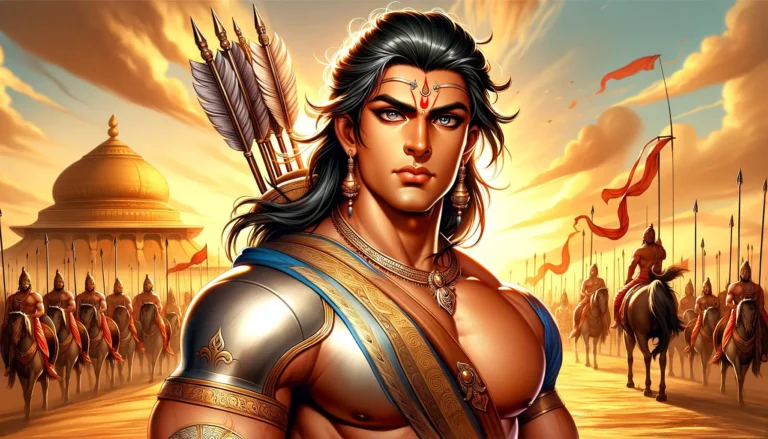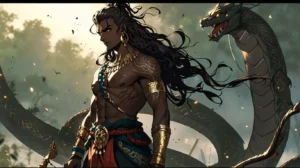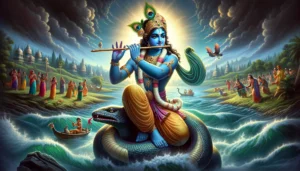In the grand epic of the Mahabharata, few characters evoke as much admiration and sympathy as Maharathi Karna. Born to Kunti and the sun god Surya, Karna’s life is a saga of struggle, loyalty, and tragic destiny. Despite his noble lineage, Karna is often depicted as an outsider, marginalized by society due to his lowly birth. Yet, his unwavering valor, unparalleled skill in battle, and steadfast loyalty make him one of the most compelling figures in the epic. In this detailed exploration, we delve into the life, character, and significance of Maharathi Karna in the Mahabharata, unraveling the layers of his persona and the profound impact he had on the events of the epic.
Early Life and Background
Karna’s origin is marked by secrecy and abandonment. Born to Kunti before her marriage to Pandu, Karna is abandoned by his mother and left to float down the river, where he is found and adopted by a charioteer. Despite his humble upbringing, Karna displays exceptional martial skills and unwavering determination from a young age. His quest for knowledge and recognition leads him to seek training from Dronacharya, who rejects him due to his low caste. Undeterred, Karna masters the art of archery through self-discipline and determination, earning him the title of “Radheya” or “son of Radha.”
Quote: “Birth is obscure and men are like rivers whose origins are often unknown.” – Karna (Mahabharata)
This quote from Karna reflects his acceptance of his humble origins and the uncertainty surrounding his birth, highlighting the theme of destiny and identity in the Mahabharata.
Characteristics and Attributes
Karna is characterized by his unwavering loyalty, unyielding sense of honor, and boundless generosity. Despite facing discrimination and ridicule due to his low caste, Karna remains steadfast in his principles and refuses to succumb to societal norms. His sense of duty and righteousness compel him to align himself with Duryodhana, despite being aware of the Pandavas’ rightful claim to the throne. Karna’s valor and skill in battle are unmatched, earning him the respect and admiration of both allies and adversaries alike.
Quote: “I will not retreat from the battle even if the three worlds were to be arrayed against me.” – Karna (Mahabharata)
In this quote, Karna reaffirms his unwavering resolve and determination to fulfill his duty as a warrior, demonstrating his indomitable spirit and courage in the face of overwhelming odds.
Struggles and Dilemmas
Throughout the Mahabharata, Karna grapples with inner conflicts and moral dilemmas that test the very core of his character. Despite his allegiance to Duryodhana, Karna is plagued by doubts and regrets regarding his choices. His friendship with Duryodhana blinds him to the injustices committed by his ally, leading to tragic consequences for both himself and others. Karna’s loyalty to his friend and his sense of honor often clash with his conscience, highlighting the complexities of human nature and the consequences of misplaced loyalties.
Quote: “A great man is always willing to be little.” – Karna (Mahabharata)
This poignant quote from Karna reflects his humility and willingness to sacrifice his own pride and ego for the sake of others, underscoring his noble qualities despite his tragic fate.
The Great War and Tragic Destiny
Karna’s role in the Kurukshetra War is pivotal, as he emerges as one of the foremost warriors on the Kaurava side. His fierce rivalry with Arjuna, his half-brother, culminates in a series of epic battles that showcase their unparalleled skill and valor. Despite his prowess on the battlefield, Karna’s tragic destiny unfolds as he faces a series of setbacks and betrayals that ultimately lead to his downfall. His death at the hands of Arjuna, through the treacherous tactics of Indra and the curse of his own teacher, Dronacharya, symbolizes the culmination of his lifelong struggles and the tragic consequences of his choices.
Quote: “Even if death is certain, I will still fight for Duryodhana. I will not retreat.” – Karna (Mahabharata)
This quote encapsulates Karna’s unwavering resolve and determination to fulfill his duty as a warrior, even in the face of certain death, showcasing his tragic heroism and steadfast loyalty to his friend and ally.
Legacy and Impact
Karna’s legacy transcends the confines of the Mahabharata, leaving an indelible mark on Indian culture and literature. His life and character serve as a poignant reminder of the complexities of human nature, the consequences of societal prejudices, and the eternal struggle between duty and personal ethics. Karna’s story continues to resonate with audiences across generations, inspiring countless adaptations, literary works, and artistic interpretations that celebrate his tragic heroism and unwavering valor.
Quote: “In the history of the world, there are but few who are possessed of great strength, courage, and patience, and verily thou art one of them.” – Karna (Mahabharata)
In this quote, Karna is praised for his exceptional qualities of strength, courage, and patience, underscoring his enduring legacy as a symbol of heroism and resilience in the face of adversity.
Conclusion
In conclusion, Maharathi Karna’s character in the Mahabharata is a testament to the enduring power of resilience, loyalty, and tragic heroism. Despite his humble origins and the injustices he faced, Karna remains a towering figure whose unwavering commitment to duty and honor continues to inspire audiences worldwide. Through his struggles, dilemmas, and ultimate sacrifice, Karna embodies the timeless themes of the Mahabharata, serving as a poignant reminder of the complexities of human nature and the enduring quest for righteousness and redemption.



[…] Maharathi Karna: The Heroic Figure of Tragedy in the Mahabharata […]
[…] Also read; Maharathi Karna: The Heroic Figure of Tragedy in the Mahabharata […]
[…] Maharathi Karna: The Heroic Figure of Tragedy in the Mahabharata […]